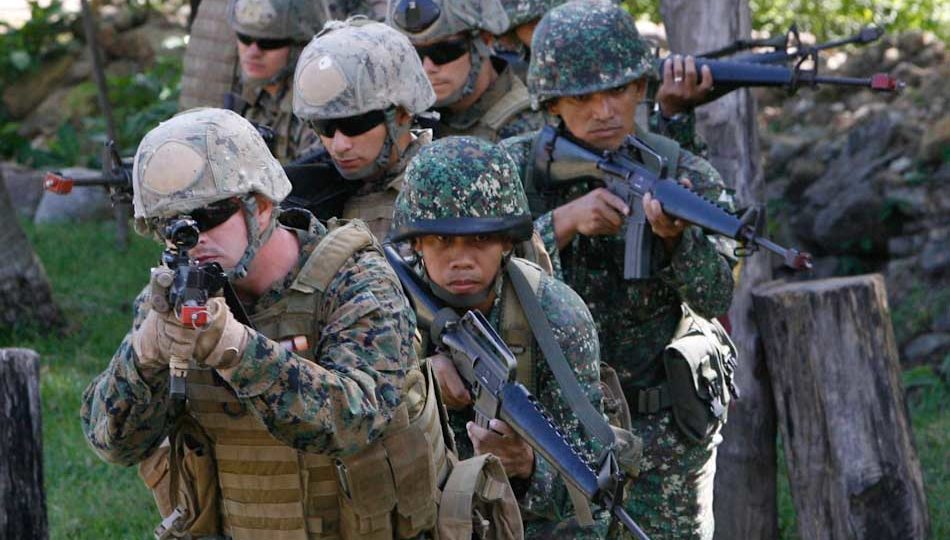The Philippines has officially set in motion the termination of the decades-old Visiting Forces Agreement (VFA) with the U.S. military, less than a month after President Rodrigo Duterte threatened he would unilaterally do so in the midst of a political spat.
The termination was confirmed today by Foreign Affairs Secretary Teodoro Locsin Jr., who said in a tweet, “The Deputy Chief of Mission of the Embassy of the United States has received the notice of termination of the Visiting Forces Agreement. As a diplomatic courtesy there will be no further factual announcements following this self-explanatory development.”
@DFAPHL The Deputy Chief of Mission of the Embassy of the United States has received the notice of termination of the Visiting Forces Agreement. As a diplomatic courtesy there will be no further factual announcements following this self-explanatory development. https://t.co/qQhywEpcea
— Teddy Locsin Jr. (@teddyboylocsin) February 11, 2020
Locsin attached a tweet written by Foreign Affairs Undersecretary Brigido Dulay, saying the signed “notice of termination of the Visiting Forces Agreement… will [be] delivered to the US Embassy in Manila forthwith.”
On the order of the President thru Executive Secretary Medialdea, Foreign Affairs Secretary Locsin signed today the notice of termination of the Visiting Forces Agreement, which will delivered to the US Embassy in Manila forthwith. @DFAPHL
— Dodo Dulay (@dododulay) February 11, 2020
The two officials’ announcement was also confirmed by Duterte’s spokesman Salvador Panelo, who said that the termination will become effective 180 days from the day the U.S. government receives the notice, adding that Locsin had “sent it to the U.S. government today.”
In a speech last night, Duterte claimed U.S. President Donald Trump was trying to “save” the VFA, but when asked about it today, Panelo was coy.
“Perhaps there were some emissaries who said that to the president, about the desire of the president of the U.S.,” he said, before acknowledging that Trump and Duterte had not spoken about the termination of the agreement, which grants the U.S. jurisdiction over criminal cases involving American servicemen in the Philippines.
It was late last month when Duterte first said he would terminate the decades-old VFA after the U.S. canceled the visa of his ally, Senator Ronald dela Rosa, who frequently travels to the U.S. to visit family (and watch Pacquiao fights in Vegas, of course). Duterte appeared to have second thoughts, however, and asked the Justice Department to review the consequences of the VFA’s termination. However, today’s confirmation proved that the temperamental leader was serious about the threat, despite being told by at least one ally that the Philippines had a lot to lose if the VFA were junked.
Meanwhile, the U.S. Embassy in Manila said in a statement that what Duterte had done was a “serious step with significant implications for the U.S.-Philippines alliance.”
“We will carefully consider how best to move forward to advance our shared interests. Our countries enjoy a warm relationship, deeply rooted in history. We remain committed to the friendship between our two peoples,” it added.
The termination of the VFA has long been a priority of the far left, who say it has led to US suspects evading justice in the past, though even champions of termination questioned Duterte’s motives for canceling it at first. Today, however, leftist leader Renato Reyes Jr., the secretary-general of the Bagong Alyansang Makabayan, welcomed Duterte’s decision, calling it “just and necessary.”
“It is long overdue. The VFA is an affront to Philippine sovereignty. It is a reminder of our status as a US neocolony,” he wrote in a Facebook post.
“We have 180 days from the day the US receives the notice for the termination to be effective,” he added. “During this 180-day transition period, the Filipino people must remain vigilant against any reversal by the Philippine Government or any intervention by the US government.”
In a bit of monumentally bad optics, the termination was announced on the same day that Defense Secretary Delfin Lorenzana attended a commemoration at the U.S. Embassy of the 1945 Battle of Manila. The World War II battle, fought by both American and Filipino soldiers, liberated the Philippines from Japanese occupation but resulted in the complete destruction of Manila and the death of more than 100,000 civilians.




